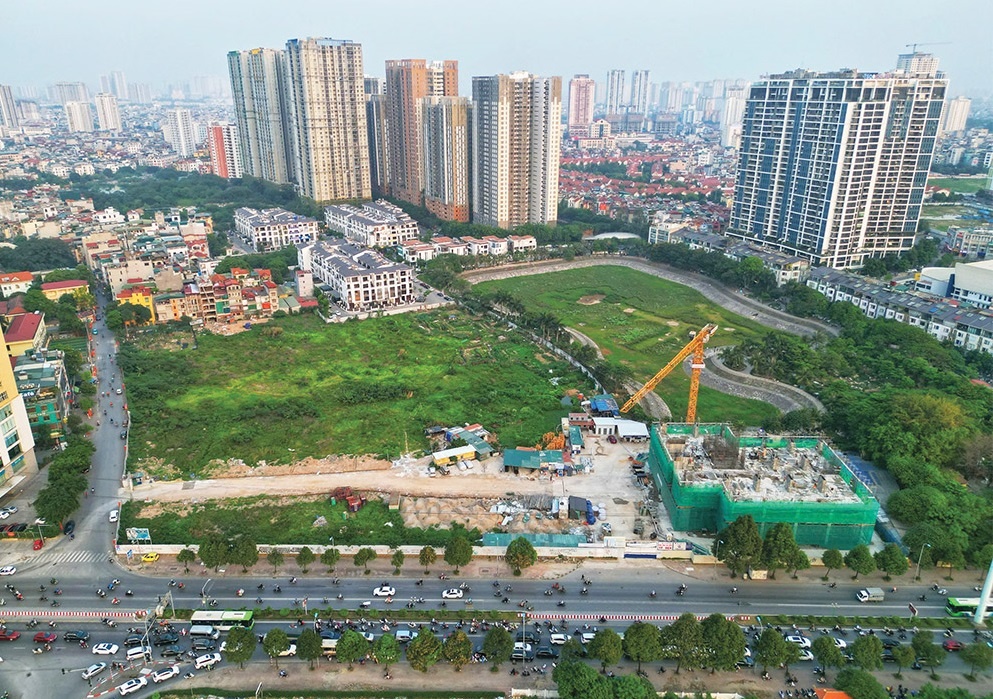New land laws to expedite house-building progress
Challenges such as the lack of consensus among owners on fixing and rebuilding old apartment buildings, a severe shortage of social housing, unattractive low-cost housing segments for investors, inefficient land resource uses, and an unstable real estate market plagued by speculative waves have persisted for years.
Nguyen Van Dinh, chairman of the Vietnam Association of Realtors, said the three new laws on housing, land, and real estate business, set to take effect in August, are expected to address longstanding bottlenecks with numerous amendments and supplements, providing a clearer and more transparent legal framework.
“One solution to the housing shortage involves addressing old apartments. According to the Ministry of Construction, over 2,500 old apartments nationwide require repair or reconstruction, with two-thirds located in Hanoi. However, the actual number of rebuilt apartments remains very low due to various challenges,” Dinh said. “The Law on Housing is anticipated to expedite this process through addressing 11 key issues related to old apartments, including inspection, compensation, resettlement plans, compensation coefficients, and achieving consensus.”
 |
| The new regulations are expected to boost the supply of both commercial and social housing |
Notably, the law proposes consolidating old apartment buildings to enhance the feasibility of resettlement for owners.
According to the Hanoi Department of Construction, there are currently almost 1,600 old apartment buildings in the city, divided into 76 zones, and over 300 independent houses. The plan includes grouping these buildings, increasing the number of floors, and enhancing green and technical areas to accommodate resettlement on-site.
Currently, some old apartment buildings that do not meet standards cannot be rebuilt at their original locations and must be relocated.
Nguyen Quoc Hiep, chairman of Global Petroleum Investment JSC, said, “This solution involves renovating individual apartment buildings on small land areas with limited height, where resettlement is not feasible. Consolidation, implemented across various wards and districts, aims to synchronise planning and comprehensively renovate old apartments.”
Bui Tien Thanh, head of the Urban Development Division at the Hanoi Department of Construction, said that if planning is carried out synchronously, it will draw in numerous investors and developers due to improved and detailed planning possibilities.
“Specifically, new regulations on land prices will ensure more frequent updates closer to market rates, leading to higher land prices and project costs. Additionally, the auction and bidding mechanisms will foster competition, further driving up land prices,” Thanh said.
Investors will need to enhance their capacity, with advantages going to those with substantial clean land holdings and strong financial resources.
Previously, deposit requirements were governed by agreements between investors and buyers, with developers often requesting large deposits, sometimes up to 90 per cent of the property value. The new laws introduce a specific deposit cap of 5 per cent, potentially impacting developers by removing an easy capital mobilisation channel.
As a result, real estate prices are expected to rise. The new policies will increase project implementation costs for developers, said a report by securities company ABS. “For consumers, the new regulations are expected to boost the supply of both commercial and social housing, offering more options to meet varying needs and incomes,” ABS added.
Forecasts suggest that Hanoi will see the highest number of apartments for sale in the next five years, with about 9,000 units, while Ho Chi Minh City will offer approximately 4,000 new apartments. The new laws are anticipated to boost housing supply.
The early implementation of the Land Law and related regulations is expected to resolve legal issues for 1,200 projects nationwide, including around 150 in Ho Chi Minh City.
The Ho Chi Minh City Real Estate Association reports that legal issues account for 70 per cent of real estate businesses’ difficulties. In the first quarter of the year, only one commercial housing project received investment approval, and no new affordable apartment projects were initiated.
Vo Hong Thang, investment director of DKRA Group, commented that in the long term, the market will increasingly prosper and this positive movement will spread to the entire economy.
“However, in the short term, specifically the last six months of the year, the three new laws will not have too much impact on real estate segments, especially with the numerous uncertainties of the world economy. These laws need 6-12 months to really penetrate the market,” he said.
Since the end of 2023, the market has had some signs of recovery but only focused on the affordable segment, especially class B and C apartments in big cities.
“However, the number of increase is not much, equivalent to 15-20 per cent of the raise in 2019,” Thang added. “The total number of deposits in banks is still high, despite very low interest rates. A defensive mentality has caused the liquidity of the real estate market to raise by very little.”
| Tran Quoc Dung, deputy general director Hung Thinh Group Land use fees constitute a significant portion of the costs associated with real estate development. The draft decree guiding the Land Law imposes excessively high land fees without fully accounting for business costs. This will increase project development costs and push up house prices, ultimately disadvantaging buyers and impacting market stability and social security in the long term. Therefore, I recommend that businesses factor in inflation costs when calculating land use fees. The draft decree should include adjustments for labour and material inflation during construction, as well as contingency and other reasonable costs. Nguyen Thanh Son, CEO, An Gia Group With the new law, buyers will have more rights protected, and the land price framework will be updated every year to make the market transparent and clear. Regulations on agricultural land will help rural areas become richer, contributing to economic growth and development of other industries. All experts, businesses, and management agencies have high expectations for the three laws related to real estate. However, there are some concerns. In the process of applying new regulations, there will be many problems, which is inevitable and requires management agencies to listen and promptly resolve them. Additionally, the early application of the law might struggle with incomplete guiding documents, causing difficulties for localities. Some circular waits may occur, such as circulars waiting for decree issuance and localities waiting for central authority directions. Thus, some problems might be delayed until solutions are found. The new law serves as a framework, while decrees and circulars are essential for detailed problem-solving. It is necessary to expedite the completion of these documents to reduce delays in implementing the law. Le Bao Long, strategy director Batdongsan.com.vn Real estate prices are expected to increase significantly after these laws take effect. Particularly, the land segment will be most affected due to additional regulations prohibiting the subdivision and sale of plots in 105 cities and towns. Additionally, the apartment segment will experience fluctuations. Primary prices will rise as new regulations impose stricter business conditions, capital ratios, and resettlement arrangements. The quality of resettlement housing development will need to match or exceed previous phases, leading to higher overall project costs. Consequently, primary real estate prices will increase, which will also cause secondary house prices in surrounding areas to surge. Le Ba Chi Nhan, economist While the new laws may make it difficult for real estate prices to decrease, they will eliminate arbitrary price increases. The regulations in these laws will create a more open, transparent market with a clear legal framework, abundant supply, and more convenient transactions. The revised Land Law will positively impact the real estate market by accelerating new legal procedures and project adjustments. When compensation prices align more closely with market rates, site clearance times for projects will be shortened. The market will see a purge of developers with weak financial capacities, strengthening cooperation between developers and more capable project partners. Although the laws on land, housing, and real estate business will take effect earlier than planned, it is crucial to promptly complete the guiding decrees and circulars. Ministries, authorities, and local governments should proactively address legal bottlenecks to increase the supply of social and commercial housing. While increased supply might not reduce real estate prices in the short term, it is expected to stabilise prices in the long term. |
 | Land law overhaul transforms land acquisition Senior partner Duyen Ha Vo and senior associate Tram Dang of VILAF explore the potential implications of upcoming changes on land acquisitions of developers engaged in real estate, energy, and infrastructure projects. |
 | Sunnier days anticipated through updated land laws The proposal to implement the revised Land Law from July instead of next year is expected to bring confidence to the real estate sector. |
 | Real estate dealmaking can level up through revised laws Vietnam’s mergers and acquisitions in the real estate market are expected to become more attractive to foreign investors following the entry into force of several related laws in August, although effective implementation will take time. |
What the stars mean:
★ Poor ★ ★ Promising ★★★ Good ★★★★ Very good ★★★★★ Exceptional
Related Contents
Latest News
More News
- Saigon Centre gains LEED platinum and gold certifications (February 12, 2026 | 16:37)
- Construction firms poised for growth on public investment and capital market support (February 11, 2026 | 11:38)
- Mitsubishi acquires Thuan An 1 residential development from PDR (February 09, 2026 | 08:00)
- Frasers Property and GELEX Infrastructure propose new joint venture (February 07, 2026 | 15:00)
- Sun Group led consortium selected as investor for new urban area (February 06, 2026 | 15:20)
- Vietnam breaks into Top 10 countries and regions for LEED outside the US (February 05, 2026 | 17:56)
- Fairmont opens first Vietnam property in Hanoi (February 04, 2026 | 16:09)
- Real estate investment trusts pivotal for long-term success (February 02, 2026 | 11:09)
- Dong Nai experiences shifting expectations and new industrial cycle (January 28, 2026 | 09:00)
- An Phat 5 Industrial Park targets ESG-driven investors in Hai Phong (January 26, 2026 | 08:30)

 Tag:
Tag:




















 Mobile Version
Mobile Version